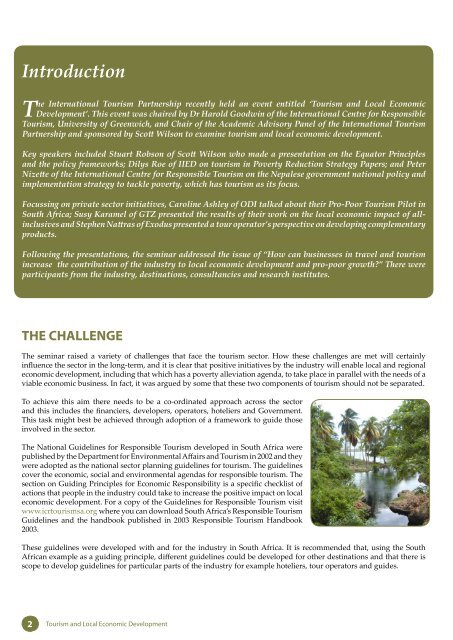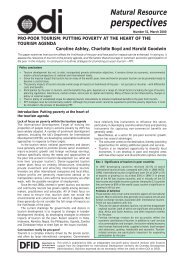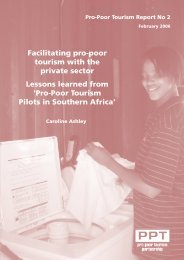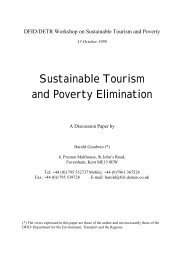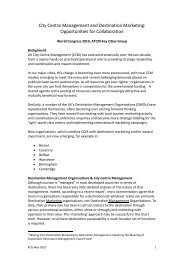Tourism and Local Economic Development - Harold Goodwin
Tourism and Local Economic Development - Harold Goodwin
Tourism and Local Economic Development - Harold Goodwin
Create successful ePaper yourself
Turn your PDF publications into a flip-book with our unique Google optimized e-Paper software.
IntroductionThe International <strong>Tourism</strong> Partnership recently held an event entitled ‘<strong>Tourism</strong> <strong>and</strong> <strong>Local</strong> <strong>Economic</strong><strong>Development</strong>’. This event was chaired by Dr <strong>Harold</strong> <strong>Goodwin</strong> of the International Centre for Responsible<strong>Tourism</strong>, University of Greenwich, <strong>and</strong> Chair of the Academic Advisory Panel of the International <strong>Tourism</strong>Partnership <strong>and</strong> sponsored by Sco Wilson to examine tourism <strong>and</strong> local economic development.Key speakers included Stuart Robson of Sco Wilson who made a presentation on the Equator Principles<strong>and</strong> the policy frameworks; Dilys Roe of IIED on tourism in Poverty Reduction Strategy Papers; <strong>and</strong> PeterNizee of the International Centre for Responsible <strong>Tourism</strong> on the Nepalese government national policy <strong>and</strong>implementation strategy to tackle poverty, which has tourism as its focus.Focussing on private sector initiatives, Caroline Ashley of ODI talked about their Pro-Poor <strong>Tourism</strong> Pilot inSouth Africa; Susy Karamel of GTZ presented the results of their work on the local economic impact of allinclusives<strong>and</strong> Stephen Naras of Exodus presented a tour operator’s perspective on developing complementaryproducts.Following the presentations, the seminar addressed the issue of “How can businesses in travel <strong>and</strong> tourismincrease the contribution of the industry to local economic development <strong>and</strong> pro-poor growth?” There wereparticipants from the industry, destinations, consultancies <strong>and</strong> research institutes.THE CHALLENGEThe seminar raised a variety of challenges that face the tourism sector. How these challenges are met will certainlyinfluence the sector in the long-term, <strong>and</strong> it is clear that positive initiatives by the industry will enable local <strong>and</strong> regionaleconomic development, including that which has a poverty alleviation agenda, to take place in parallel with the needs of aviable economic business. In fact, it was argued by some that these two components of tourism should not be separated.To achieve this aim there needs to be a co-ordinated approach across the sector<strong>and</strong> this includes the financiers, developers, operators, hoteliers <strong>and</strong> Government.This task might best be achieved through adoption of a framework to guide thoseinvolved in the sector.The National Guidelines for Responsible <strong>Tourism</strong> developed in South Africa werepublished by the Department for Environmental Affairs <strong>and</strong> <strong>Tourism</strong> in 2002 <strong>and</strong> theywere adopted as the national sector planning guidelines for tourism. The guidelinescover the economic, social <strong>and</strong> environmental agendas for responsible tourism. Thesection on Guiding Principles for <strong>Economic</strong> Responsibility is a specific checklist ofactions that people in the industry could take to increase the positive impact on localeconomic development. For a copy of the Guidelines for Responsible <strong>Tourism</strong> visitwww.icrtourismsa.org where you can download South Africa’s Responsible <strong>Tourism</strong>Guidelines <strong>and</strong> the h<strong>and</strong>book published in 2003 Responsible <strong>Tourism</strong> H<strong>and</strong>book2003.These guidelines were developed with <strong>and</strong> for the industry in South Africa. It is recommended that, using the SouthAfrican example as a guiding principle, different guidelines could be developed for other destinations <strong>and</strong> that there isscope to develop guidelines for particular parts of the industry for example hoteliers, tour operators <strong>and</strong> guides.2 <strong>Tourism</strong> <strong>and</strong> <strong>Local</strong> <strong>Economic</strong> <strong>Development</strong>


